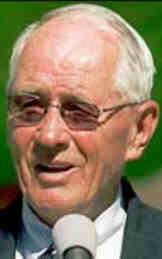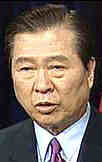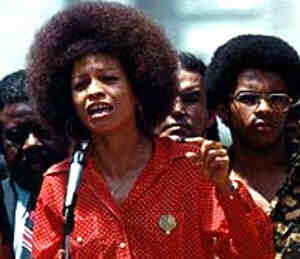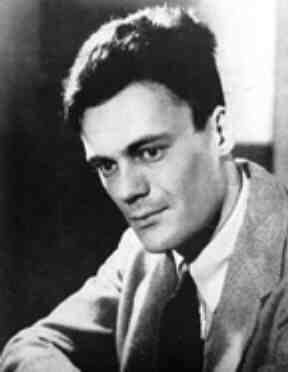 Deaths
which occurred on an October 13: Deaths
which occurred on an October 13:
2002
Stephen
E. Ambrose [photo >], 66, of lung cancer from
smoking, US historian and (not always accurate) author of more than 30 best-sellers
including many on WW II, such as D-Day June 6, 1944: The Climactic Battle
of World War II (June 1994) — Pegasus Bridge (November 1988)
[excerpt: D-Day:
0000 to 0015 Hours] — Comrades: Brothers, Fathers, Heroes, Sons,
Pals (June 1999) [excerpt: Ambrose's
father] — Band of Brothers: E Company, 506th Regiment,
101st Airborne From Normandy To Hitler's Eagle Nest (June 1993)
[excerpt: Holland:
October 2 - November 25, 1944]— Eisenhower and the German
POWs: Facts Against Falsehood (November 1992) — The Victors:
Eisenhower and His Boys: The Men of World War II (October 1998)
[excerpt: Pointe-du-Hoc]—
Americans at War (October 1998) — Citizen Soldiers: The
U.S. Army from the Normandy Beaches to Bulge to the Surrender of Germany,
June 7, 1944-May 7, 1945 (1997) [excerpt: Capt.
Colby] — The American Heritage New History of World War
II (September 1997) — The Good Fight: How World War II Was
Won by Stephen E. Ambrose, [line break omitted before “by”](03
April 2001) — The Wild Blue: The Men and Boys Who Flew the B-24s
over Germany (14 August 2001) [excerpt: Learning
to Fly in Combat]; and others on American history: Eisenhower:
Soldier and President (October 1991) — Nixon: The Education
of a Politician 1913-1962 (July 1988) , Undaunted Courage: Meriwether
Lewis, Thomas Jefferson, and the Opening of the American West (1996)
— Nothing Like It in the World: The Men Who Built the Transcontinental
Railroad 1863-1869 (29 August 2000) — Crazy Horse and Custer:
The Parallel Lives of Two American Warriors (June 1996) — Upton
and The Army (July 1993) — Halleck: Lincoln's Chief of Staff
(April 1996) —. His last book is To America: Personal Reflections
of an Historian (19 November 2002). Ambrose was born on 19 January
1936. [Autobio
on his web site]
2002 Mohammed Abayat, of the
Al-Aqsa Martyrs Brigade, when the public telephone he is using in Beit Jala,
West Bank, explodes in the evening.
2002 Palestinian woman,
56, when Israeli soldiers fire on the car in which she was, that was circumventing
a roadblock by taking a side road. The other two women in the car are wounded.
2002 Palestinian boy, 3, as his house collapses while he
is sleeping in the early hours, when Israeli troops blow up a neighboring
house suspected of being the exit of an infiltration tunnel from Egypt,
in the Rafah refugee camp, Gaza Strip.
2002 A few of the most
severely injured in the Bali nightclub
explosion and fire the previous night, including at least one on the
3-hour evacuation flight to Darwin, Australia.
2002 Arthur
Pratt, 65, after suffering on 07 October 2002 some 20 severe bites
from his wife Kelli Pratt, 45, when he refused to copulate, in Modesto,
California.
2001 Four Afghans, by a US (mis)guided 1-ton bomb
aimed at Kabul airport from a Navy F/A-18 Hornet plane, which, instead,
destroys four houses in a residential area. Eight Afghans are injured.
2000 A Bosnian, who detonates a handgrenade, as four German
NATO-led Stabilization Force (SFOR) soldiers attempt to arrest him, in Sarajevo.
The soldiers and one civilian are injured
2000 Gus Hall,
90, long-time Stalinist head of the miniscule American Communist Party (which
claims 20'000 members in 2000). In the 1950s he spent over 8 years in prison
for "advocating the violent overthrow of the US government.” He
was the Communist candidate for President (never getting as much as 1% of
the vote), 4 times, the last one in 1984..
1994 Eric Morse, 5, dropped
out of 14th floor window by “Tony”, 11, and Jessie Rankins,
10.
5-year-old was killed
over candy
Boy refuses to shoplift and is dropped 14 floors to his death.
In Chicago, Eric Morse
was dangled outside a 14th-floor window and dropped to his death because
he was doing the right thing: refusing to steal candy from a store,
Two neighborhood boys, Jessie Rankins (real name) and “Tony”
(not his real name), hatched a murder plot as they walked home from
grammar school. They were angry because Eric had refused to steal
for them. Hours later, the two boys lured Eric and his 8-year-old
brother, Derrick, to a vacant 14th-floor apartment at the South Side
Ida B. Wells public housing development, saying it was their clubhouse.
Knocking the boards out of a
hollow window frame, they again urged the brothers to steal for them.
The brothers refused, so the older boys dangled Eric out the window,
Derrick told police. Derrick pulled his brother to safety by grabbing
his arms, but seconds later, the boys grabbed Eric again, pulled him
to another window and dangled him outside by his wrists. Again, Derrick
tried to rescue his brother, grabbing his right hand. The other boys
let go and as Derrick tried to lift his brother back over the window
ledge, “Tony” bit him on the right hand. Derrick lost his
grip. And Eric fell. He suffered massive head injuries and was pronounced
dead at 19:56. at Wyler Children's Hospital.
Eric was the 53rd child in the Chicago area age 14 or younger to be
killed in 1994. The circumstances of his death—young children
committing the most heinous of crimes—recalled Robert Sandifer,
the 11-year-old boy accused of fatally shooting a 14-year-old neighbor
girl, only to be murdered by members of his own gang. It also recalled
the 11-year-old boy who confessed to tying up his 83-year-old neighbor
and stabbing her to death with a kitchen knife.
Both murderers also were angry because Eric and Derrick had told their
mother they were being "strong-armed" by the older youths for refusing
to steal. Jessie told the police that he and his friend “Tony”
were walking home from Doolittle Elementary School about 14:30 when
“Tony” suggested they find Eric, take him to the vacant
CHA apartment and throw the youngster out the window because Eric
had been causing trouble. Jessie agreed to do so.
The two plotters saw Eric and Derrick on the street in the evening
and took them to a rowhouse, where they slapped Eric around and held
Derrick. The brothers ran out of the rowhouse, but when they exited
an elevator at the 13th floor at 3833 S. Langley Ave. in the Wells
developments, the two bullies were waiting for them. That is when
Eric and his brother were lured to the site of the final struggle.
Less than two hours after police
were notified, they talked to Derrick and shortly after arrested “Tony”
and Jessie on a crowded street corner at 39th Street and Vincennes
Avenue. Someone pointed them out, After giving oral and written statements
to police, the boys were held overnight at the Juvenile Detention
Center, 1100 S. Hamilton Ave., where Associate Judge Charles May on
Friday 14 October 1994 ordered that they remain until at least Monday
17 October 1994, when a trial date would be set. If convicted of the
first-degree murder charges in the delinquency petition filed against
them, the two could be sent to a locked residential facility outside
Illinois until about their 19th birthdays. Illinois has no such facilities,
but because of a recent rash of murders committed by juveniles, authorities
are considering building some here. In addition, authorities are considering
lowering the age when a juvenile can be charged as an adult with murder
to 10 from 13.
The fathers of
both murderers are in prison. Jessie recently had several brushes
with Juvenile Court authorities. In an unlawful-use-of-weapons conviction
earlier in October 1994, he was placed on one year's probation and
sentenced to 90 days' home confinement.
Police were notified about 20:00 on Thursday 13 October 1994 that
a child had fallen out of a window of the Wells public housing building,
and when they arrived, found the child on the ground. Eric's body
was "twisted, he looked like every bone in his body was broken.
Both “Tony” and Jessie, who were
named on juvenile petitions with first-degree murder, made admissions
in statements to police. They admitted their part in the crime. As
far as showing remorse, they were stunned, one could'nt tell. Eric's
brother looked horrified. He was scared. He was terrified, just like
any 8-year-old would be, terrified of watching his brother dangle
from the 14th floor and fall to his death.
There was no apparent gang connection in the incident. Some residents
of the Wells housing development where the killing occurred blamed
the CHA for failing to secure the building adequately. Throughout
the afternoon of Friday 14 October 1994, work crews boarded up doors
and windows of vacant apartments in the 3833 S. Langley building.
CHA officials said work crews had reboarded the unit from which Eric
fell just hours before the struggle. The unit, Apt. 1405, was reboarded
three times in April, as well. After the work crews left on Thursday
13 October, someone broke through the wood bolted over the door. It
was unclear whether that was done by the boys or someone else. CHA
crews constantly battle to keep up with vacant units that are broken
into, often by gangs who use them to hide guns and drugs. The site
of Eric's death carried at least one sad irony: The building is home
to the CHA's victim-assistance program, so members of the authority's
newly formed crisis-response team were on the scene immediately.
On 23 January 2001, after 5
years in prison, “Tony” would be set free by a Juvenile
Court judge who said the teen had shown good behavior and was being
given "a chance at a good and productive life.”
But Jessie Rankins would go from bad
to worse in prison. On 24 September 1999, then 15, he would be convicted,
as an adult, to 9 years in prison for sexual assault on another inmate
on 22 November 1966. |
1980: 6 Blacks, murdered gratuitously in Buffalo, NY.
1972:: 13 of the 40 passengers and 5 crew members aboard a plane
chartered Urugayan Fairchild FH-227 twin turboprop airplane headed to Santiago,
Chile, with a Uruguayan rugby team, as the plane crashes high into the Andes
due to pilot error. Others would die soon after from their wounds, hunger,
cold, and a massive avalanche. The search for the missing plane proves fruitless
and everyone on board is thought to be dead, but 72 days after the crash,
16 would emerge alive, having survived by eating the dead, and tell their
story, which would become the subject of books and movies, including
Alive. On the 30th anniversary survivors would play a symbolic
game with the members of the Chilean team they were to play against in 1972.
1961 Prince L Rwagasore of Burundi, murdered; (Hero
of the Nation Day). Rwagasore, the eldest son of Mwami (King) Mwambutsa
was the embodiment of populist aspirations and the strongest supporter of
the monarchy. His assassination ushered in a crisis of legitimacy from which
Burundy had yet to recover 40 years later.
1866 Hopkins,
mathematician
1948 Ulisse Caputo, Italian artist
born on 04 November 1872.
1945 Milton Snavely Hershey,
born on 13 September 1857, US founder in 1903 of the Hershey Chocolate Corporation
and of the factory town Hershey, Pennsylvania, with the $1'000'000 he got
in 1900 by selling his Lancaster Caramel Company, which he had founded after
unsuccessful tries at candy shop followed by a candy manufacture, upon completing
in 1876 his four-year apprenticeship with a confectioner.
1914
Walter Herbert Withers, English-born (22 October
1854) Australian painter. — more
1893 Barthélémy Menn, Swiss painter born on 20 May 1815.
— more with link
to a self-portrait.
1883 August Friedrich Siegert,
German artist born on 05 March 1820.
1817 Julius-César Ibbetson,
British painter, printmaker, and writer, born on 29 December 1759. —
MORE
ON IBBETSON AT ART “4” OCTOBER
with links to, and comments on images.
1812 Sir Isaac Brock,
some of his Brits and Ameridians, and many US soldiers at the Battle of
Queenstown Heights, on the Niagara frontier in Ontario, during
the War of 1812: British and Amerindian forces under Sir Isaac Brock defeat
Americans under General Stephen Van Rensselaer at the , Canada. The British
victory, in which over 1000 US troops are killed or wounded, effectively
ends any further US invasion of Canada. Sir Isaac Brock, who captured the
city of Detroit two months earlier, is also killed during the battle.
1715 Nicolas
Malebranche, mathematician
1678 Cesar Boetius van Everdingen, Dutch painter born in 1617 (1616?).
— MORE
ON EVERDINGEN AT ART “4” OCTOBER
with links to, and comments on images.
1601 Tycho Brahe
greatest naked-eye observer astronomer, in Prague.
0054 Claudius
I, Roman Emperor, poisoned by his wife, Agrippina. |
 2000
The Nobel Peace Prize is awarded to Kim
Dae Jung, 76 [photo >], for his work for
democracy and human rights in South Korea and in East Asia in general,
and for peace and reconciliation with North Korea in particular.
2000
The Nobel Peace Prize is awarded to Kim
Dae Jung, 76 [photo >], for his work for
democracy and human rights in South Korea and in East Asia in general,
and for peace and reconciliation with North Korea in particular. 1970
Communist Angela Davis arrested unjustly
1970
Communist Angela Davis arrested unjustly
 1943
Poet Robert Lowell to prison for draft evasion
1943
Poet Robert Lowell to prison for draft evasion
 Deaths
Deaths